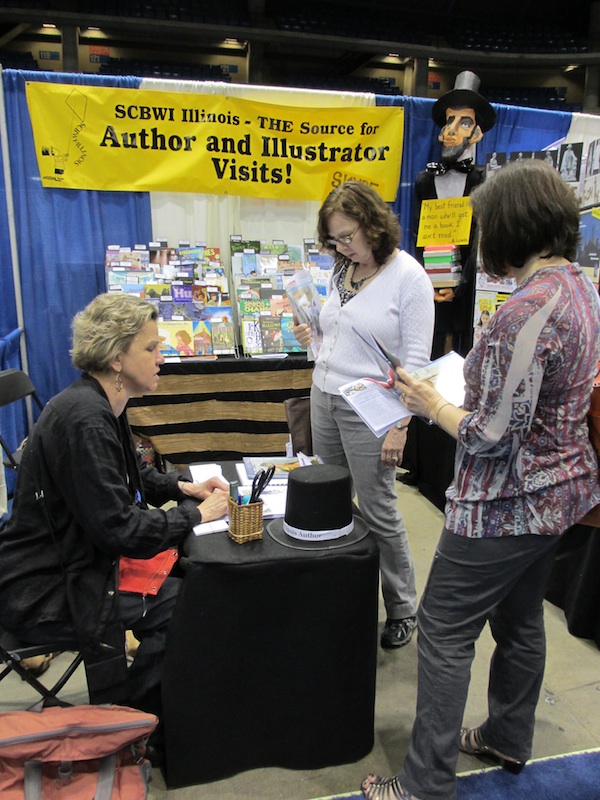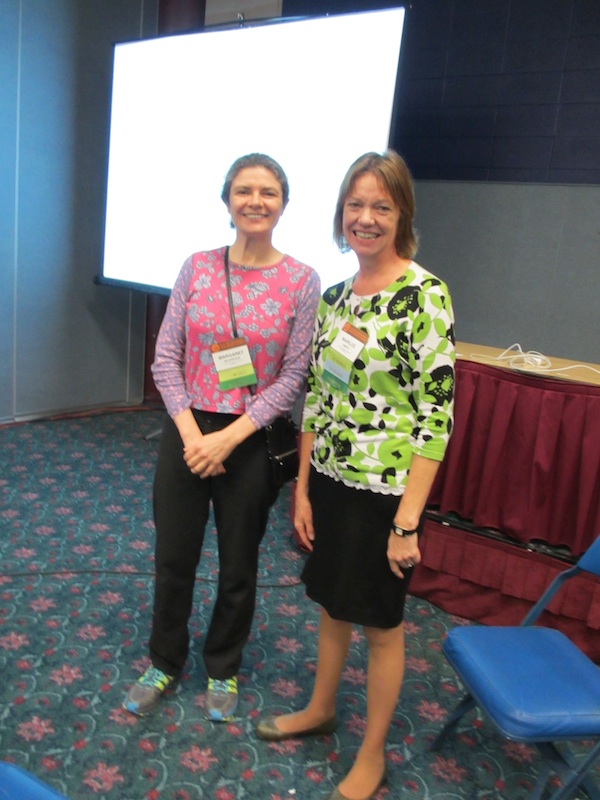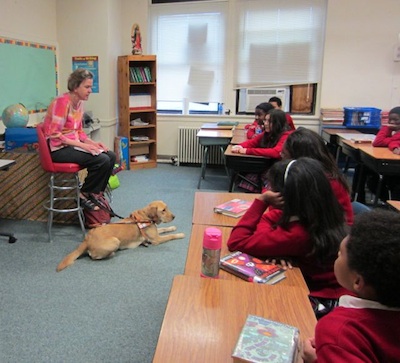As a kid, spending three days with a bunch of schoolteachers would have sounded like the ultimate form of punishment. I guess wisdom really does come with age — when the Illinois Reading Council contacted me last Fall to see if I’d be interested in coming to their annual conference and spend time with thousands of teachers from across the state, I considered it a privilege.

That's me at the SCBWI booth. Whitney's under the table. (Photo by Cheryl May.)
My sisters Cheryl and Marilee accompanied Whitney and me on the trip from Chicago, and when we stepped off the train in Springfield, our driver Brian was there with a sign. “It says your name!” they exclaimed, describing the B-E-T-H F-I-N-K-E in bold lettering. I felt like a star.
The star treatment continued throughout this well-organized and well-attended three-day conference. Award-winning author Esther Hershenhorn had published an extremely flattering post about Hanni and Beth: Safe & Sound just days before the conference started. Attention from Esther’s Teaching Authors blog brought a lot of teachers to the Illinois Society of Childrens Book Authors and Illustrators (SCBWI) booth to meet new Seeing Eye dog Whitney and me. I Brailled out words for the teachers to take home to their students along with a bookmark of the Braille alphabet. I could almost hear the wheels spinning in the teachers heads, conjuring up ways to use Braille to encourage their students back home to read print.
I gave a presentation, enjoyed time with the seven lively teachers at my table as one of the featured guests at the author luncheon, and attended a few sessions, too. Everywhere I went I heard dedicated teachers asking questions, looking for suggestions, sharing ideas, all of them oh so eager to learn tnew techniques and methods to motivate their students.
My Chicago neighbor Margaret MacGregor is one of those dedicated teachers, and so is my sister Marilee Amodt. Margaret teaches in the Chicago Public Schools, and Marilee teaches in the Orlando Public Schools. The two of them teamed up to lead a session about teaching vocabulary to students from lower-income families, and on our train back to Chicago Margaret mentioned how important it is for kids to learn a lot of vocabulary words before they start school.
“Books have a lot of words in them that kids don’t hear spoken out loud,” Margaret said. In fact, children’s books use twice as many words as kids hear

That's Margaret on the left, with Marilee, before their presentation. (Photo by Cheryl May.)
on regular TV. And even, get this, twice as many, like, words, like than, like, college students like, use when they are, like, talking to each other.
Margaret told me about the Hart-Risley Study, which says low-income children hear, on average, 30 million fewer words spoken than their more affluent peers before they turn four. Margaret was not misspeaking, and that is not a typo. I looked it up when we got home. 30 million fewer words.
It seemed particularly fitting to be listening to Margaret and Marilee’s presentation the weekend before Whitney and I head to Hendricks Elementary School on Chicago’s Southside. Hendricks is one of the Chicago Public Schools participating in the Sit Stay Read! (SSR) program I volunteer for. In order for a school to participate in Sit Stay Read!, 95 percent or more of the students enrolled must qualify for the National School Breakfast program. The University of Illinois at Chicago (UIC) Center for Literacy helped Sit Stay Read! design the program to coordinate with school curriculum — it’s meant to improve children’s reading fluency, encourage them to become successful readers, inspire them to explore the world through books, and help them learn to respect people and animals. A Chicago Tribune story by Rick Kogan explains:
SSR’s mission is fueled by sad statistics: On average, a child growing up in a middle-class family will have the benefit of as many as 1,700 hours of one-on-one picture-book reading before he or she enters school, while the child in a low-income family will have 25 hours.
Sit Stay Read! uses dogs and volunteers in all sorts of clever ways: children read aloud to specially trained therapy dogs, human volunteers visit as “book buddies” to help individual kids, and people like me come as guest readers – the books we read to the kids always have something to do with, guess what? Dogs!
Guest readers also teach the kids about possible careers – when members of Chicago’s Lyric Opera visit, they read The Dog Who Sang at the Opera to the kids. Firefighters read Firehouse Dog during visits, and visiting police officers read about police dogs. I was asked to come with Whitney and talk about being a writer.
I’m looking forward to visiting Hendricks Monday. It’ll be Whitney’s first experience as a Sit Stay Read! dog, and I hope my stories of learning new ways to read and write after losing my sight might encourage the students at Hendricks to keep trying, too.
 Seems like anytime an employer goes out of the way to thank you, you can bet on it: you’re being let go. Last week I got an email from WBEZ thanking me for the essays I’ve recorded for them over the years. The note went on to say WBEZ is reorganizing their local programming to emphasize live shows. They hope their new formatting will encourage listeners to comment on social media or phone in live and in person. Translation: they will no longer be airing pre-recorded essays like the ones I used to write for them.
Seems like anytime an employer goes out of the way to thank you, you can bet on it: you’re being let go. Last week I got an email from WBEZ thanking me for the essays I’ve recorded for them over the years. The note went on to say WBEZ is reorganizing their local programming to emphasize live shows. They hope their new formatting will encourage listeners to comment on social media or phone in live and in person. Translation: they will no longer be airing pre-recorded essays like the ones I used to write for them.





 On Monday morning Whitney and I caught a commuter train to
On Monday morning Whitney and I caught a commuter train to